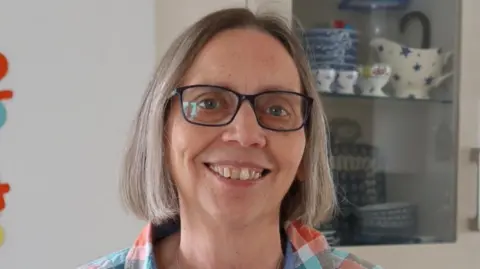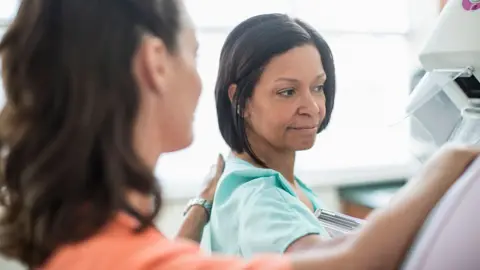Targeted breast cancer treatment 'transformational'
 Hilary Stobart/PA Images
Hilary Stobart/PA ImagesMore targeted and less aggressive radiotherapy for low-risk breast cancer could spare thousands of women the harsh side effects of the treatment, a trial has found.
The Import Low trial, led by The Institute of Cancer Research, London, and the University of Cambridge, found limiting radiation to the tumour area, rather than treating the whole breast, was just as effective.
The study included 2,018 women across 30 radiotherapy centres in the UK, who were monitored for 10 years after treatment.
The technique, which has since been adopted by the NHS, has "transformed" the way the disease is treated in its early stages, researchers said.
More than 37,000 women have radiotherapy for breast cancer in the UK every year.
The treatment uses radiation to kill cancer cells and is usually given after surgery to reduce the risk of the disease coming back but has a number of side effects.
The Import Low trial compared three radiotherapy approaches - whole breast, partial breast and a reduced dose.
After a decade, cancer recurrence rates in the group given partial radiotherapy was 3%, the same proportion as those who had been treated with a more aggressive approach.
Patients who had targeted radiotherapy were also less likely to experience long-term changes in breast appearance.
Some 15% reported noticeable changes at five years compared with 27% in the whole-breast radiotherapy group.
 Getty Images
Getty ImagesHilary Stobart, now 70, was diagnosed with breast cancer in December 2008, with a 2cm tumour in her left breast.
Ms Stobart, who was 54 at the time, was offered the chance to take part in the trial after surgery and was treated with partial radiotherapy.
"I had three weeks of radiotherapy but suffered no side effects, other than some soreness in my breast and nipple in the first few weeks," she said.
"Ten years on, I am doing fine.
"Whilst I may have had some niggling worries in the early days, having seen the results of the trial, I feel positive and optimistic now.
"I know that I was lucky enough back then to have had the best treatment, a treatment that other women will be routinely offered now."
Charlotte Coles, chief investigator of the Import Low study, said the trial had "transformed" how early breast cancer is treated.
"By targeting the area around the tumour, rather than the whole breast, we have demonstrated that patients can achieve the same outstanding long-term outcomes with fewer complications," Prof Coles said.
"This approach is now widely adopted across the NHS, sparing thousands of women from unnecessary radiation exposure, the professor of breast cancer clinical oncology at the University of Cambridge added.
Dr Anna Kirby, consultant clinical oncologist at The Royal Marsden NHS Foundation Trust, said: "The long term results of this study confirm that a less aggressive approach, limiting radiotherapy to the tumour rather than the whole breast, is just as effective as traditional whole breast radiotherapy.
"Patients receiving partial breast radiotherapy experience fewer side effects while maintaining excellent cancer control."
It is hoped that more than 9,000 women in the UK could benefit from more targeted treatment.
Follow Cambridgeshire news on BBC Sounds, Facebook, Instagram and X.
